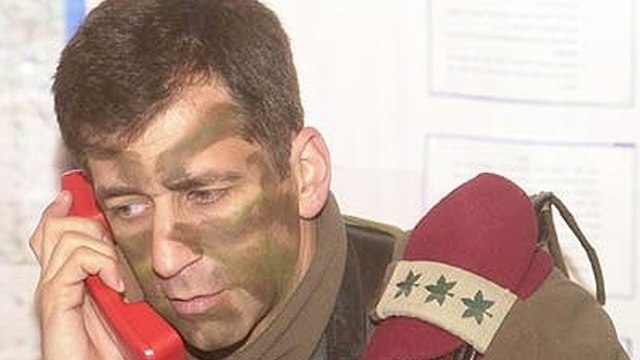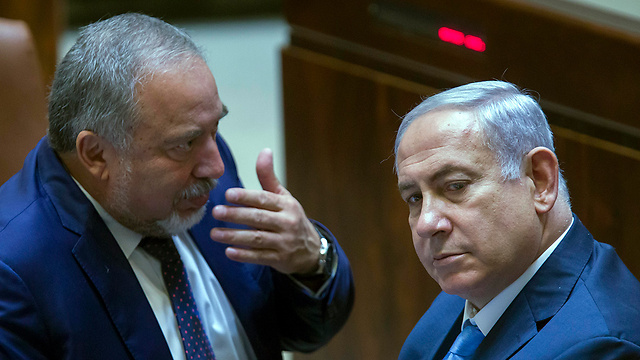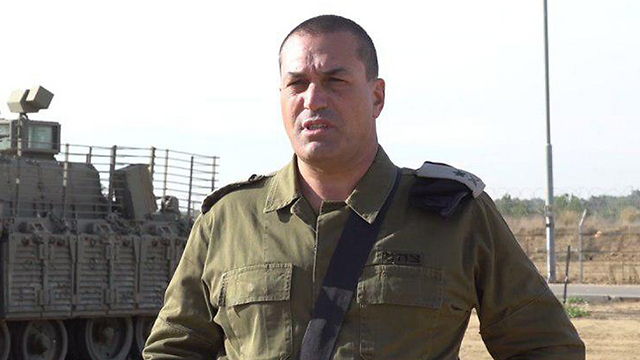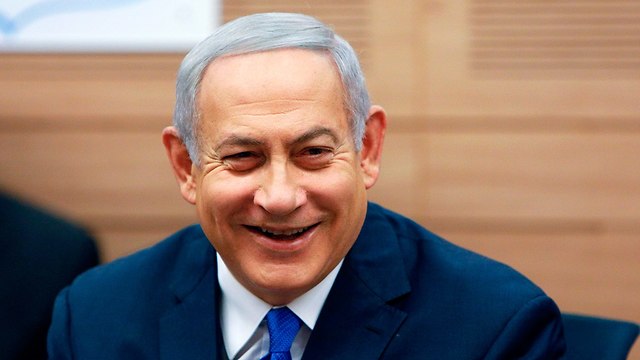Maj. Gen. Aviv Kochavi will have to reshape the IDF’s ‘war between wars’ campaign, bringing a different attitude to resolving the problems and dilemmas that now emerge on the northern front; Maj. Gen. Eyal Zamir’s most important task will be to head the team leading the next multi-annual plan to replace the Gideon Plan.
Maj. Gen. Aviv Kochavi, who was approved Sunday as the IDF’s next chief of staff, was the natural candidate for the job. He has operational, tactical and administrative experience, and he had a hand in shaping military strategy and policy.
He is thorough, creative and has the “temperament of an IDF chief.” Just like there’s a judicial temperament, the IDF chief also needs the ability to motivate people, and earn their confidence and trust, even in difficult situations in which decisions are made fast. In addition, Maj. Gen. Kochavi knows how to communicate with the political leadership openly and without pandering, and speak to civilians at eye level.

So from the moment the candidacy of Maj. Gen. Yair Golan was removed due to inappropriate political reasons, then-defense minister Avigdor Lieberman or Prime Minister Benjamin Netanyahu had no choice but to pick Kochavi, who is more suitable in almost every aspect to fill the role of IDF chief than the other two candidates—Maj. Gen. Eyal Zamir and Maj. Gen. Nitzan Alon.
Zamir was chosen to be the deputy IDF chief, and it is likely Alon will succeed him. This in itself means they are head and shoulders above other commands and worthy in every aspect, but they are not yet ready to enter the IDF chief’s office, unlike Kochavi.
Kochavi will enter the IDF chief’s office on January 15, 2019, two weeks after the planned retirement of Eisenkot, after the two officers asked to have a few more weeks of training.

Eisenkot is leaving Kochavi a military ready for war on two fronts—and perhaps even more—at the same time. A military that sticks to its values and is well equipped to face the challenges ahead. One can say the IDF is at one of its best positions over the past 20 years.
But Kochavi won’t be able to settle for just that. Primarily, because the Middle Eastern front is constantly changing. The new IDF chief will have to formulate a new policy including strategy and tactic methods to thwart Iranian military entrenchment in Syria and prevent the transfer of advanced weapons to Hezbollah, as well as stop the Lebanese terror group’s efforts to make its arsenal of rockets and missile into precision-guided projectiles.
Things have changed since the Assad army accidentally shot down a Russian intelligence plane—something it blamed on Israel, whose fighter jets were attacking in the area, prompting the Syrian anti-aircraft fire—and Kochavi will have to reshape the IDF’s “war between wars” campaign, bringing a different attitude to resolving the problems and dilemmas that now emerge on the northern front.
Kochavi will also have to aid the Security Cabinet and the prime minister to shape a strategy for the southern border, which will help establish calm on the Gaza border and further deepen the effective—both militarily and diplomatically—cooperation with Egypt. On this front Kochavi has rich experience as the former commander of the Gaza Division, where he secured many achievements but also one massive failure—the capture of IDF soldier Gilad Shalit. It was in this role as the Gaza Division head that Kochavi received the most criticism, but he has paid the price and learned the lessons, and it is safe to assume he is now prepared to propose new ways to handle this abscess.

It’s also safe to assume Kochavi will continue his predecessor Eisenkot’s efforts to upgrade the Ground Forces’ capabilities. He will also have to formulate a multi-annual plan to replace the one led by Eisenkot, the Gideon Plan.
As Eisenkot’s deputy, Kochavi has already started working on establishing the IDF’s Cyber Corps and on adding a significant number of surface-to-surface missiles to the IDF’s arsenal, as former defense minister Lieberman demanded with the support of the current General Staff. The latter seeks to allow the IDF to carry out attacks from the ground or the sea that it had only done from the air so far.
Kochavi will also have to lead the army through an election campaign, which at the very latest is expected in November 2019. He will have to carefully maneuver to ensure the IDF is not dragged into the political battle.
There are just a handful of the tasks on Kochavi’s desk as he enters the IDF chief’s office, and there’s no doubt he will experience some difficult times, even though there is no big war on the horizon right now.
Netanyahu’s rush to appoint Zamir
Even though Lieberman and Netanyahu both agreed on Kochavi as their preferred candidate to inherit outgoing IDF Chief of Staff Gadi Eisenkot, the announcement was delayed because Netanyahu insisted on including the selection of Maj. Gen. Zamir, his erstwhile military secretary, as the next deputy IDF chief. Lieberman insisted not to include Zamir in the announcement about Kochavi, fearing his appointment to be seen as a political appointment done by the prime minister—as the deputy IDF chief is selected by the defense minister (which he still was at the time) and the incoming IDF chief, and them alone.

Still, Zamir’s appointment was met with criticism. Some claim it was Netanyahu’s personal and political interests that landed Zamir the no.2 job in the IDF.
No one questions Zamir’s professional and leadership skills or his integrity. But critics have pointed to the fact Zamir only had one major general position—the GOC Southern Command—and had no experience in managing a department in the General Staff before being sent straight into the deputy IDF chief’s office.
While Lieberman was able to postpone the announcement on Zamir’s selection, his resignation allowed Netanyahu, who took on the defense portfolio, to announce his choice. But haste makes waste, and it is not wise to have both the IDF chief and his deputy to assume office at the same time. It’s better for the IDF chief to first enter office, and only after a short period of adjustment and experience as the commander of the army alongside the veteran deputy who could support him, should Zamir enter office as well.
The political lobby led by Netanyahu is tainting Zamir’s appointment as a political one, implying he does not deserve to serve as the deputy chief of staff. .Zamir did an impeccable job as the military secretary to Netanyahu, and as far as I know of, without being involved even once in the Prime Minister’s Office’s political scandals.
It’s not easy to maintain a clean performance as a professional officer, when one is a close associate of and advisor to the most influential political figure in Israel. Zamir succeeded in that. In addition, his performance as the GOC Southern Command gained many praises, and rightfully so.
Zamir was the one who began the through treatment of the cross-Gaza border terror tunnels, which bore fruit even then, prepared the IDF for its major next activity in the strip, and managed to prevent Gaza from blowing up in our faces despite the severe humanitarian crisis there.
Those abilities are required especially in an organization headed by people who make crucial decision and fast. But, it appears it does not really bother Netanyahu. He trusts Zamir, and everything is probably less important to him. I do not know who would Kochavi choose to serve as his deputy, had he the liberty to decide himself, even though I know for a fact he appreciates Zamir.

I assume Kochavi would have preferred for Zamir to serve another major-general position as division head in the General Staff before becoming his deputy, who should be capable of managing and leading the entire military infrastructure and to fill in for the chief of staff when he is unable to fulfill his duties in times of routine, emergency or war. In any case, in my opinion, Kochavi did wisely when he chose not to confront with the prime minister on this matter, which is hardly a matter of life and death.
There is no doubt that Maj. Gen. Alon could have also been an excellent deputy chief of staff, but the combination between Kochavi the paratrooper and Zamir the tanker creates a balanced duo in the IDF’s top military brass—which is a good thing. Kochavi will know to identify strategic twists and demonstrate operational creative thinking during Israel’s war between wars and asymmetrical confrontations, while Zamir will make sure the army has the abilities and infrastructures, enabling it to face any kind of confrontation. On this matter, Kochavi is leaving Zamir a great legacy.
If a war does not break out, Zamir’s most important task upon assuming the deputy chief of staff position would be to head the team leading the next multi-annual plan to replace the Gideon Plan. An equally important task would be bolstering the IDF’s capabilities, developing its fighting methods, and improving the ground forces’ abilities to survive in the battle field.
The incoming deputy chief of staff will have to urgently attend to the IDF’s deficiencies in preparedness for war, and the impairment discovered by the committee appointed by Eisenkot to examine the army’s readiness for war. And those are only a few of the not so simple tasks Zamir would have to cope with as the deputy of the next chief of staff.
As reported by Ynetnews
